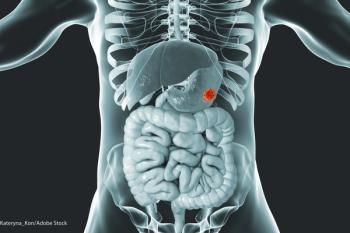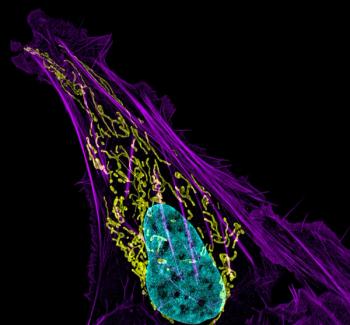
Lori Wirth, MD, discusses the role of cabozantinib in the second-line setting for patients with radioiodine-refractory differentiated thyroid cancer and reviews the results from the COSMIC-311 trial.

Your AI-Trained Oncology Knowledge Connection!


Lori Wirth, MD, discusses the role of cabozantinib in the second-line setting for patients with radioiodine-refractory differentiated thyroid cancer and reviews the results from the COSMIC-311 trial.

A real-world study using a voluntary questionnaire found an association between increased pain severity and decreased health-related quality of life for patients with multiple myeloma.

Although clinical trial enrollment declined among patients with lung cancer from 2019 to 2020 during the COVID-19 pandemic, mitigation strategies helped to improve enrollment.

Prospective data found higher rates of occult signet ring cell gastric cancer among individuals with no family history of gastric cancer but who carried CDH1 P/LP variants.

A survey of United States breast oncologists suggested that racial differences exist in the perceived barriers to accessing genetic counseling and testing for patients with breast cancer.

A survey suggests individuals with cancer who were undergoing active treatment were more likely to endorse COVID-19 related misinformation than those with no history of cancer.

Updated results from the KEYNOTE-826 study show a favorable risk-benefit ratio for pembrolizumab plus chemotherapy for patients with persistent, recurrent, or metastatic cervical cancer.

Results presented at an ESMO Virtual Plenary in March 2022 show that maintenance therapy with selinexor decreased the risk of progression or death for patients with advanced or recurrent endometrial cancer.

Jun Gong, MD, spoke with CancerNetwork® about the latest research from the journal ONCOLOGY® on elderly patients with muscle-invasive bladder cancer.

The BRACAnalysis CDx test received FDA approval as a companion diagnostic for olaparib for the treatment of patients with germline BRCA-mutated HER2 negative high-risk early-stage breast cancer.

The FDA granted fast track designation to the BCMA-targeting Tri-specific T-cell Activating Construct, HPN217, for patients with relapsed or refractory multiple myeloma who received at least 4 lines of prior therapy.

Laparoscopic proximal gastrectomy led to less vitamin B12 supplement use than total gastrectomy without negatively impacting survival for upper third early gastric cancer.

Compared with a wait-list control group, mindful awareness practices and survivorship education significantly reduced depressive symptoms from preintervention to postintervention in younger survivors of breast cancer.

Patients treated with ceritinib who had ALK-positive non–small cell lung cancer with active brain metastases and/or leptomeningeal disease experienced encouraging responses in the phase 2 ASCEND-7 trial.

Phase 2 data highlighted a high complete response rate and undetectable minimal residual disease rate in patients with indolent clinical forms of mantle cell lymphoma who received ibrutinib plus rituximab.

Ofer Sharon, MD, spoke about the PROphet diagnostic platform for non–small cell lung cancer and the latest interim results from the prospective PROPHETIC trial in the most recent episode of CancerNetwork’s® "Oncology Peer Review On-The-Go" podcast.

Patients with advanced midgut neuroendocrine tumors experienced a clinically relevant improvement in median overall survival when treated with 177Lu-Dotatate compared with the control of high-dose long-acting octreotide, although the difference was not significant.

Matthew Allaway, DO, detailed benefits of using an emerging transperineal biopsy approach to identify prostate cancer in hard to access areas of a patient’s prostate.

Assessing adverse effects with a toxicity index and patient-reported outcomes at baseline and treatment-emergent toxicities revealed insights into why postmenopausal patients with ductal carcinoma in situ discontinued endocrine therapy.

Research presented at the 2022 Multidisciplinary Head and Neck Cancers Symposium highlighted the potential to detect oropharyngeal cancer recurrence using circulating tumor tissue modified viral–human papillomavirus DNA.

Women undergoing treatment with immunotherapy, targeted therapy, or chemotherapy in cancer clinical trials were at a significantly increased risk of severe adverse effects compared with men.

A health-related quality of life assessment found an association between worsened self-reported fatigue, cognitive function, and physical function, with enzalutamide treatment for patients with metastatic, hormone-sensitive prostate cancer but improved deterioration-free survival for overall health and quality of life.

The final analysis of the phase 3 IMmotion151 trial did not reveal a significant improvement in overall survival with atezolizumab plus bevacizumab over sunitinib for previously untreated patients with metastatic renal cell carcinoma.

Data from cohort H of the EV-103 study highlighted the promising antitumor activity of neoadjuvant enfortumab vedotin for patients with muscle-invasive bladder cancer who are cisplatin-ineligible.

Datar Cancer Genetics announced that its TriNetra-Prostate blood test, which was developed to detect early-stage prostate cancer, received breakthrough device designation from the FDA.

A 5-day prophylactic postoperative intravenous antibiotic regimen did not reduce the rate of surgical site infections vs a 1-day regimen and increased the risk of antibiotic complications for patients with lower extremity bone tumors.

On this episode of the Oncology® Peer Review On-The-Go, Emily Smith, MD, discussed a patient case of basal cell carcinoma she and colleagues published in the journal ONCOLOGY®.

A phase 3 study from China identified that gonadotropin-releasing hormone analogs administered with chemotherapy reduced the risk of premature ovarian insufficiency among premenopausal patients with breast cancer.

A substudy of the European‐Myeloma-Network‐02/Hovon‐95 trial suggests flow cytometry–based monitoring of minimal residual disease is effective for longitudinal evaluation of responses in patients with multiple myeloma.

Patients with chronic lymphocytic leukemia experienced functional T cell and antibody responses after receiving a vaccine for COVID-19, according to a prospective study.

Published: January 7th 2022 | Updated:

Published: October 29th 2021 | Updated:

Published: October 29th 2021 | Updated:

Published: November 17th 2021 | Updated:

Published: March 13th 2021 | Updated:

Published: March 30th 2021 | Updated: